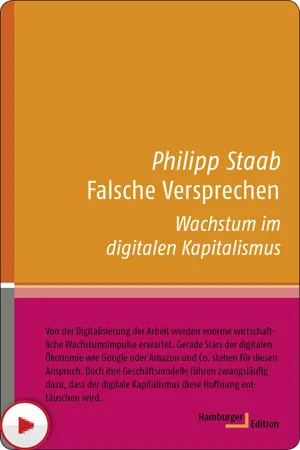
- 136 pages
- English
- ePUB (mobile friendly)
- Available on iOS & Android
About this book
Über das Wachstumsversprechen und die Tücken des digitalen KapitalismusDie Digitalisierung von Arbeit und Wirtschaft ist derzeit in aller Munde. Die einen verbinden mit der disruptiven Kraft digitaler Innovationen die Hoffnung auf eine neue Quelle unbegrenzten Wachstums. Andere fürchten massive Beschäftigungsverluste und eine radikale Zunahme sozialer Ungleichheit.Philipp Staab bietet eine differenzierte Analyse der Leitunternehmen des Silicon Valley, die weltweit ein spezifisches Wirtschaftsmodell propagieren. Er beschreibt dessen historische Genese, beleuchtet die Ideologie des digitalen Kapitalismus und kontrastiert diese mit den ökonomischen Imperativen in der digitalen Ökonomie. Die Unternehmenspolitik von Google, Apple, Amazon und Co. beschreibt der Autor als ökonomisches Programm, das auf die Bearbeitung einer Sollbruchstelle des gegenwärtigen Wirtschaftssystems zielt.Seit dem Ende des Fordismus kann in den hochentwickelten Ökonomien der OECD-Welt die Entwicklung des Konsums nicht mit den Produktivitätssteigerungen in der Wirtschaft Schritt halten. Der digitale Kapitalismus bildet den Versuch, die systematische Nachfrageschwäche des gegenwärtigen Wirtschaftssystems durch die Rationalisierung der Konsumtionsapparate zu tilgen. Dabei erzeugt er jedoch Widersprüche, die das Problem, zu dessen Lösung er antritt, weiter verschärfen.Der digitale Kapitalismus der Gegenwart ist von einem Konsumtionsdilemma geprägt, das die Wachstumspotenziale der Digitalisierung in ihr Gegenteil verkehren könnte. Die Verheißungen des digitalen Kapitalismus könnten sich schon bald als falsche Versprechen entpuppen..
Frequently asked questions
- Essential is ideal for learners and professionals who enjoy exploring a wide range of subjects. Access the Essential Library with 800,000+ trusted titles and best-sellers across business, personal growth, and the humanities. Includes unlimited reading time and Standard Read Aloud voice.
- Complete: Perfect for advanced learners and researchers needing full, unrestricted access. Unlock 1.4M+ books across hundreds of subjects, including academic and specialized titles. The Complete Plan also includes advanced features like Premium Read Aloud and Research Assistant.
Please note we cannot support devices running on iOS 13 and Android 7 or earlier. Learn more about using the app.
Information
Table of contents
- Cover
- Titel
- Impressum
- Inhalt
- I Einleitung
- II Von der politischen Ökonomie des 20.Jahrhunderts zum digitalen Kapitalismus
- III Digitale Ideologie- Digitale Ökonomie
- IV Von der Rationalisierung der Produktion zum effizienten Konsum
- V Digitalisierung und soziale Ungleichheit
- VI Das Konsumtionsdilemma
- Fußnoten
- Bibliografie
- Zum Autor